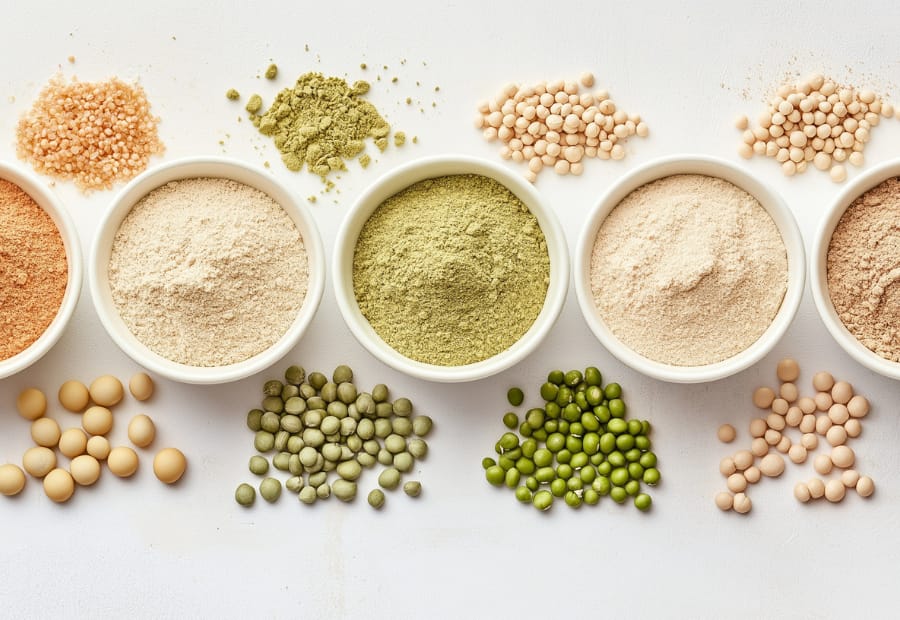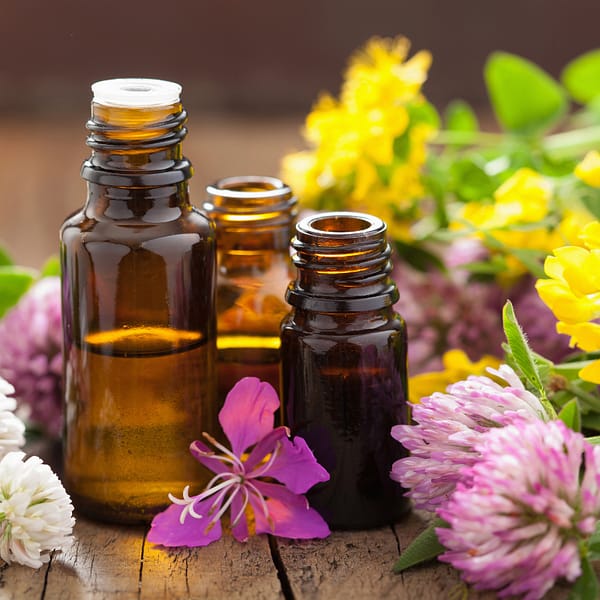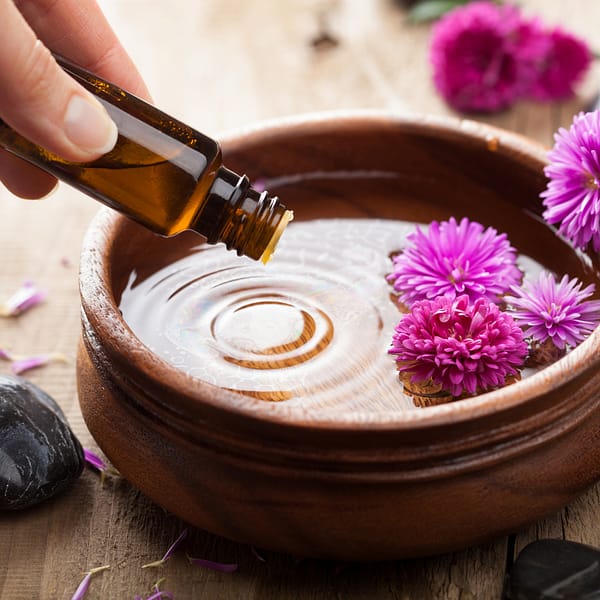
While liquid extracts and essential oils share some similarities in their plant compounds, they are actually very different, both in their chemical composition and how they are used. They are two very different products serving different final use purposes. Both are extracted from parts of plants, but that is where the similarity ends.
The process used to create herbal liquid extracts vs herbal essential oils use distinct methods. Liquid herbal extracts are made by soaking the plant material in a solvent such as alcohol, allowing active ingredients to be extracted. The creation of essential oils is more complex and requires a variety of specialized methods, such as steam distillation or cold pressing, which results in a highly concentrated form of the plant’s essential oils.
Essential oils are highly concentrated, aromatic oils extracted from various parts of a plant, such as fruits, flowers, leaves, bark, stems and roots. The plant part used varies with different plants, but all are designed to yield all the wonderful fragrant properties that they contain.
Essential oils are primarily used for their distinct and potent scents which makes them a key staple in aromatherapy, perfumery, and holistic healing techniques. These potent scents capture the “essence” of the plant’s natural fragrance and offer therapeutic effects that help promote relaxation, emotional well-being and mental clarity.
Essential oils are made using a steam distillation or cold-pressing extraction method. While the extraction process is significantly different than that used to create liquid extracts, both methods aim to isolate the beneficial aromatic actives found in plants. When creating essential oils, the choice of extraction method and plant part will affect potency and the overall application of the essential oil.
For example, citrus fruits often use the peel for cold-press extraction, while lavender flowers use steam distillation to yield their specific essential oil.
Cold pressing is a basic process often used to create essential oils from citrus fruits. The citrus peel, such as orange or lemon peel, is placed in a machine where it is punctured by rotating spiked rollers, causing the oil glands within the peel to release their essential oil; this oil is then collected as a watery emulsion, which is later separated from the water through centrifugation to yield the pure essential oil, all without the use of heat, preserving the fresh aroma of the fruit.
To concentrate the oils to over 99% purity, trace amounts of dissolved wax from the fruit peels are removed through a process called winterization.
Essential oils can last anywhere from a year to several years, depending on the type of oil and how it’s stored. Generally, essential oils don’t technically expire, but it is possible that they can oxidize over time, which may cause a loss of potency and effectiveness.


Nature’s Answer takes great pride in their non-GMO Project Verified, USDA Organic Essential Oils which are 100% pure organic. Our oils are distilled from flowers, fruits, leaves and botanical roots that contain all the essential properties provided by nature to deliver a liberating and soothing aromatherapeutic support for health and wellness*. Nature’s Answer offers oils in both single and oil blends.
Here are a few of Natures Answer best-selling essential oils along with a brief description of their wellness benefits:
Organic Frankincense is a top seller at Nature’s Answer. It is extracted through a distillation from the aromatic resin of the Boswellia carterii tree. It has been valued since ancient times and has been used in various ceremonies referenced in Egyptian scrolls as well as in both the Old and New Testaments. The scent itself has a spicy, unique incense-like fragrance and is widely recognized for its uplifting aromatherapeutic properties.
Organic Peppermint is another best seller at Nature’s Answer. Organic peppermint essential oil is distilled from the mentha piperta plant. This mint often grows in home gardens. The peppermint scent is distinctive and an uplifting, refreshing scent.
Organic Lavender is native to countries along the Mediterranean. The plant is often found in herb gardens due to its fragrant leaves and extraordinary flowers. The scent offers a soothing lavender known for its calming and relaxing effects.
There are several ways to use Nature’s Answer pure organic essential oils:
You can tell if an essential oil has gone bad if it has a different scent, color, or consistency.
Essential oils are generally safe when used correctly, but if they are used incorrectly, they can also be harmful. Essential oils can be toxic if used internally or swallowed or can irritate and burn the skin if applied incorrectly.
Yes, essential oils can stain clothing, especially if not cleaned up promptly.
To clean essential oils from clothing, act quickly to prevent staining. Start by blotting the area with a dry paper towel to absorb excess oil. Next, apply a small amount of dish soap or a stain remover directly to the spot, gently working it in with your fingers. Let it sit for 5–10 minutes, then rinse thoroughly with cold water. Finally, launder the item as usual, avoiding hot water or a dryer until the stain is completely removed, as heat can set the stain. For delicate fabrics, test the cleaning solution on a hidden area first.
*These statements have not been evaluated by the FDA. This product is not intended to diagnose, treat, cure, or prevent any disease
Ready to transform your wellness journey? Shop our herbal extracts and discover the Nature’s Answer difference today!
Get an Instant 10% Off subscribe to our mailing list and get special offers!